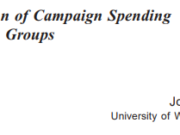Episode 32: OPAWL – Building AAPI Feminist Leadership v. Dave Yost, et al.
OPAWL – Building AAPI Feminist Leadership v. Dave Yost, et al., argued before Circuit Judges Raymond M. Kethledge, Eric E. Murphy, and Andre B. Mathis in the U.S. Court of Appeals for the Sixth Circuit on July 23, 2025. Argued by Elisabeth C. Frost (on behalf of OPAWL – Building AAPI Feminist Leadership), Mathura Jaya Sridharan (on behalf of Dave Yost, et al.), and Jason Walta (for Amicus Ohio Education Association).
Background of the case, from the Brief of Appellees – Cross Appellants (Second Brief):
It is well established that lawful permanent residents (“LPRs”) are entitled to First Amendment protection, including for their political speech. And the Supreme Court has long held that spending to promote or oppose direct democracy measures is core First Amendment expression. Nevertheless, [in 2024], Ohio enacted Ohio Revised Code § 3517.121 (“Section 121”), making it a crime for any noncitizen—including LPRs—to engage in any political spending.
Section 121’s broad prohibitions reach every conceivable type of spending, from direct contributions to independent expenditures, whether made “directly or indirectly through any person or entity,” and apply even to spending “in support of or opposition to a statewide ballot issue or question, regardless of whether the ballot issue or question has yet been certified to appear on the ballot.” Id. § 3517.121(B)(2). At the same time, Section 121 invites political weaponization, mandating that the Attorney General investigate any alleged violation made by any Ohio elector. Id. § 3517.121(G)(2)(a). The law’s sheer breadth, lack of tailoring, and threat of unrestrained investigations threaten and will chill the core First Amendment activity of not just noncitizens, but also citizens and domestic organizations who take donations from noncitizens or involve noncitizen decisionmakers….
In support, Ohio relies overwhelmingly on a reading of Bluman v. Federal Election Commission, 800 F. Supp. 2d 281, 288 n.3 (D.D.C. 2011), aff’d, 565 U.S. 1104 (2012), that is at odds with the decision itself. Bluman held that Congress may constitutionally prohibit foreign citizens other than LPRs from directly contributing to candidates or to expressly advocate for the election or defeat of a candidate, but in writing for that court, then-Judge Kavanaugh repeatedly cautioned that restrictions on political spending by LPRs or for issue advocacy would raise substantial constitutional questions. See, e.g., id. at 292 (making explicit court was not deciding whether Congress could extend ban to LPRs or restrict noncitizens engaging in “issue advocacy and speaking out on issues of public policy,” warning its holding “should not be read to support such bans”). [Emphasis in original.]
The Bluman court was right to be concerned—and this Court should be, too, now that Ohio has enacted such a ban….
Statement of the Issues
STATEMENT OF ISSUES ON APPEAL [from the Brief of Appellees – Cross Appellants (Second Brief) [OPAWL]]
- Did the district court abuse its discretion in preliminarily enjoining Defendants from enforcing Section 121 based on the statute’s definition of individual foreign national, which the legislature purposefully enacted to include lawful permanent residents?
- In the alternative, should the Court affirm the district court’s preliminary injunction because Section 121 unjustifiably discriminates against noncitizens in violation of the Equal Protection Clause?
STATEMENT OF ISSUES ON CROSS-APPEAL
- Did the district court err in concluding that Plaintiffs were not likely to succeed on their claim that Section 121’s prohibition on ballot-issue spending violate the First Amendment, and should this Court remand to the district court to issue a preliminary injunction based on that claim?
- Are Plaintiffs likely to succeed on their Fourteenth Amendment challenge to Section 121 because several essential provisions of the law are unconstitutionally vague and invite arbitrary enforcement, and should this Court remand to the district court to issue a preliminary injunction based on that claim?
- Are Plaintiffs likely to succeed on their overbreadth challenge, and should this Court remand to the district court to issue a preliminary injunction based on that claim?
STATEMENT OF THE ISSUES [from the Brief of Appellants – Cross Appellees (First Brief) [Ohio]]
- Whether the District Court erred in preliminarily enjoining Ohio’s law restricting campaign spending by foreign nationals as inconsistent with the First Amendment.
- Whether the District Court erred in preliminarily enjoining Ohio’s law as to all foreign nationals despite concluding that the law transgresses the Constitution only as to lawful permanent residents.
- Whether the District Court erred by not limiting its preliminary injunction of Ohio’s law to the party plaintiffs.
Resources:
- CourtListener docket page for OPAWL – Building AAPI Feminist Leadership v. Dave Yost, et al.
- Ohio Revised Code § 3517.121 (“Section 121”)
- Brief of Appellants – Cross Appellees (First Brief) [Ohio]
- Brief of Appellees – Cross Appellants (Second Brief) [OPAWL]
Listen to the argument here:
The Institute for Free Speech promotes and defends the political speech rights to freely speak, assemble, publish, and petition the government guaranteed by the First Amendment. If you’re enjoying the Free Speech Arguments podcast, please subscribe and leave a review on your preferred podcast platform.














